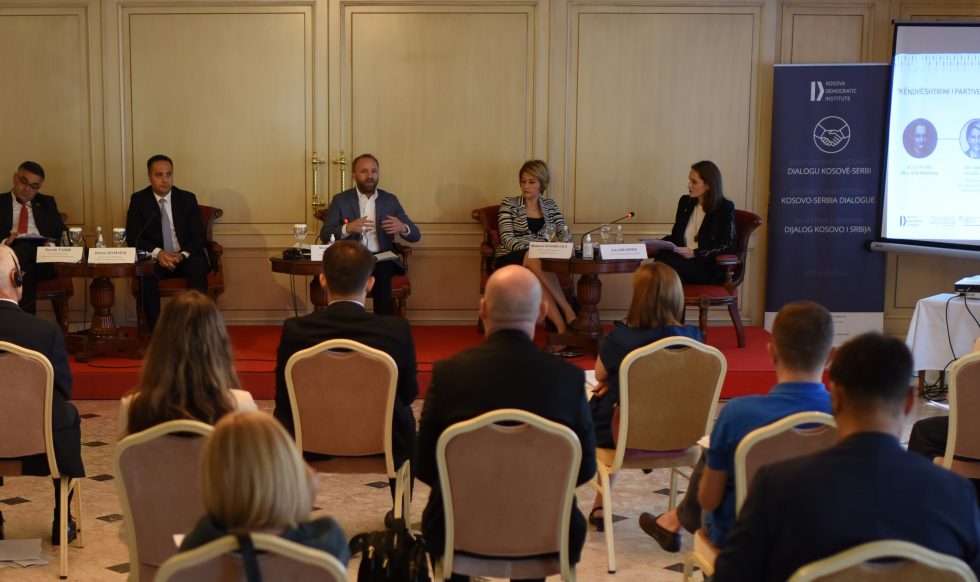


Kosovo Democratic Institute (KDI) organized today the conference “New chapter of the Kosovo-Serbia dialogue?”, divided into two panels. This Conference was attended by representatives of parliamentary groups, as well as representatives of civil society and persons familiar with the process.
In general, all panellists and participants in this Conference agreed that the continuation of the dialogue is inevitable and that it is necessary to reach a political and social consensus.
The discussion was organized in the framework of the project “Promotion of a well-informed and participatory process in the final phase of the Kosovo-Serbia dialogue” supported by the Swiss Embassy in Kosovo.
You can find more details on the discussion in the link below
During the opening of this Conference, Jeta Krasniqi, Project Manager in KDI, stated that KDI has been organizing since 2016 dozens of public discussions at the central and local level – with MPs, civil society, persons familiar with the dialogue process and experts to contribute to the increase of transparency, accountability and inclusiveness about the dialogue with Serbia. She added that at this stage, it remains to be clarified by the Government how this process will proceed.
In his opening remark, the Swiss Ambassador to Kosovo stated that the process of normalization with Serbia should be of national interest for Kosovo, regardless of who represents the Republic of Kosovo in Brussels. He added that a broad political consensus is an important factor in preparing for a lasting solution.
Following the opening remark, KDI presented a discussion paper in relation to the impact of dialogue on the internal level. Violeta Haxholli, author of this paper, stated that the dialogue remains a challenge even for the new government, same as for the previous governments. She stated that despite the fact that the current government has shifted this topic down to the list of priorities, the dialogue again finds a way to be at the top of Kosovo’s state agenda. Finally, Haxholli added that a broad political spectrum consensus is needed, in addition to the coordination between the Prime Minister and President of the country, in order to successfully conclude this process.
In the first panel of discussion, the political representatives provided their positions on the future of this process, as well as the developments so far. The Head of the Parliamentary Group of LVV, Mimoza Kusari-Lila, stated, among others, that “it is true that dialogue has started 10 years ago, as it is true that the dialogue has been severely damaged. Do not forget that in 2017 and 2019, the exchange of territories, namely establishment of mono-ethnic states, was the main topic of discussions that led to splitting in Kosovo, thus risking everything that has been invested and created for the future of this country”.
The opposition parties criticized the approach and work of the executive in relation to this process. Abelard Tahiri, Head of the Parliamentary Group of PDK, stated that the previous process of dialogue has brought numerous benefits, mentioning, among others, the Justice Agreement as one of the most important dialogue agreements. Moreover, Tahiri stated that he believes that the recognition between Kosovo and Serbia should be our main goal, but the membership to UN, as according to him “[…] without being member of UN, we have not concluded the issue of the international subjectivity”.
Driton Selmanaj, MP of LDK, sated that Kosovo has no clear position in this process, and the Government is not prepared for the topic of dialogue, and it seems that there are improvisations in steps and tactical moves. Finally, Besnik Tahiri, Head of the Parliamentary Group of AAK, pointed out that the recent proposal of four points by the Prime Minister Kurti in Brussels shows the ad-hoc approach employed by the Government for the dialogue.
The second panel of the discussion, attended by representatives of the civil society and persons familiar with the process, was characterized with different viewpoints on the progress of the dialogue achieved so far, how to act further, as well as concrete topics of the dialogue. Demush Shasha, Director of Institute Epik, stated that solutions proposed for the conclusion of the dialogue between Kosovo and Serbia should be a European model that has proven to be successful within EU countries. Shqipe Pantina, political analyst and former MP, stated that in addition to the political consensus, it should be also worked in view of achieving the social consensus for the dialogue, in order to have a lasting final solution. On the other hand, Miodrag Mili?evi?, Director of NGO-Aktiv, stated that the Serbian community in Kosovo has not been involved in the dialogue process. With regards to the issue of Association, he mentioned the fact the managing team, composed of local Serbs, has not prepared the Association statute yet, thus making the substantial discussion of the concerned topic impossible. Ardian Arifaj, Director of Portal “Democracia”, stated that even though the process is new in terms of its participants, the dialogue topics are and will continue to remain the same as in the negotiation process in Vienna.
In general, all panellists and participants in this Conference agreed that the continuation of the dialogue is inevitable and that it is necessary to reach a social consensus.
The discussion was organized in the framework of the project “Promotion of a well-informed and participatory process in the final phase of the Kosovo-Serbia dialogue” supported by the Swiss Embassy in Kosovo.
Discussion of the first panel is available here, whereas for the second panel is here.